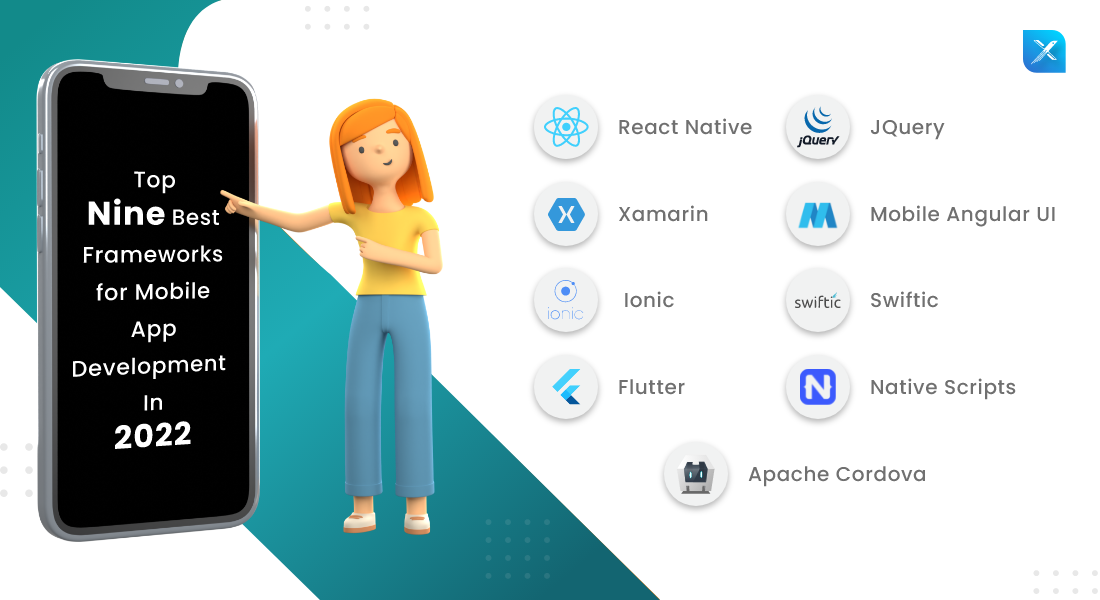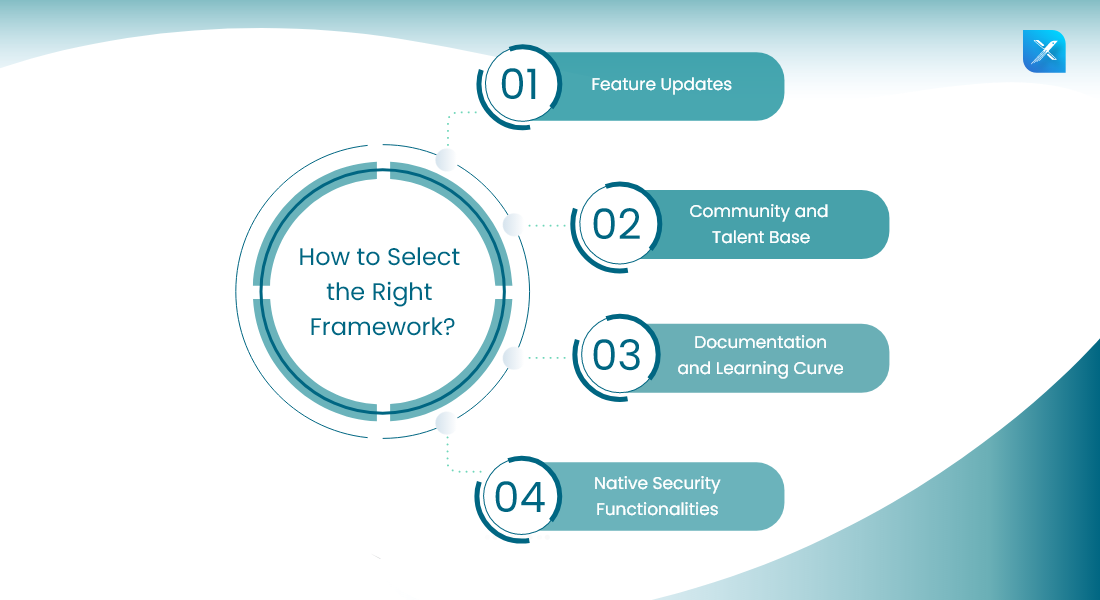Web Based Vs Cloud Based...
July 25, 2024


Before you hire dedicated mobile app developers, you should lock the framework you plan to use for the mobile app development lifecycle. But, why? We are glad you asked.
Users generally uninstall 56% of apps within a week of downloading them. This means that despite converting a user, there is over a 50% chance that you might witness churn within a week. There are many reasons for this app uninstallation trend – poor app performance, bugs, bad UX, etc. How can you mitigate the risk of these issues? By using the right mobile app development framework.
Our team has scanned through the app development framework ecosystem and populated a list of top frameworks we believe can accelerate and augment the mobile app development lifecycle. The list was prepared based on:
So, as you set out to hire dedicated developers, here are the mobile app development frameworks you must consider for 2022.

Here are the best frameworks for mobile app development in 2022, based on our rigorous analysis across the landscape of alternatives.
Facebook launched React Native as an open-source framework, and it quickly piqued the interest of the global developer community. The framework is developed in JavaScript and is the preferred alternative for cross-platform applications.
React Native brings a wide range of features packed in one efficient framework. It requires low code and supports code reusability, increasing developer productivity and project efficiency. React Native has one of the easiest maintenance modules that simplify deployment and post-deployment maintenance processes. Moreover, it also works well with a family of third-party APIs and plugins to increase the scope of functionalities.
Famous Projects Developed on React Native
Some of the most widely used mobile applications like Instagram, Airbnb, and Amazon Prime Video are developed using React Native.
Xamarin is an open-source and cross-platform app development framework launched by Microsoft. Hence, there are no surprises because it is based on .net.
Xamarin brings a comprehensive range of APIs, backend systems, libraries, tools, and programming languages under one umbrella. While most frameworks available on this list are suited for IOS or custom Android app development, Xamarin works well across IOS, Android, WatchOS, tvOS, macOS, and Windows.
The framework shows the possibility of a platform backed by an active community of developers. Over 60,000 contributors for Xamarin have made it a robust framework with embedded diagnostic tools, SDK managers, and app loaders.
Popular Projects Developed with Xamarin
Xamarin was used in developing The World Bank’s survey collecting app and the consumer-facing app for Alaska Airlines.
Formerly known as the Adobe PhoneGap, Apache Cordova was developed and launched by Apache and Adobe. Today, it is known as one of the most preferred frameworks, especially for Android development.
The framework works as an open-source platform and brings the best of JavaScript, HTML, and CSS3. This way, it allowed for local app development and accelerated testing. This also solves the problem of API accessibility, which is often experienced with in-browser apps.
Cordova has a dependable backend system and works well across platforms with a single codebase. It syncs well with third-party tools that augment the developer’s capability for application management.
Popular Projects Developed with Apache Cordova
Wikipedia and the DHS Program were developed using the Apache Cordova framework.
You cannot build a recommended list of mobile app development frameworks for any year without including Flutter in it! Flutter is a UI toolkit that uses Skia, a popular 2D rendering engine, to produce cross-platform and native applications. Like other dependable frameworks backed by tech giants, Flutter was developed and launched by Google. And the backing by Google makes it one of the most preferred frameworks for when you hire dedicated developers.
Flutter’s customizable widgets accelerate the app development lifecycle by a significant margin. This de-risks larger projects and ensures they are efficiently developed on time and within budget.
Popular Projects Developed with Flutter
Two major projects – Google Ads and Xianyu by Alibaba – were both developed using Flutter.
JQuery is one of the most trusted and tested frameworks that leverage HTML5 and supports cross-platform application development. It is particularly known for its ThemeRoller that helps developers customize app themes to a great extent.
JQuery is one of the few frameworks that work well with other frameworks like Adobe PhoneGap. Since it is free and open-source, it syncs well with projects seeking cost-effectiveness with uncompromised performance.
It also provides a wide range of easy-to-use APIs and dependable functionalities like automatic initialization.
JQuery Mobile cannot help you develop and deliver a high-performance mobile application on a standalone basis. But, in conjunction with other frameworks, it can deliver an intuitive user experience.
Popular Projects Developed with JQuery Mobile
Many companies like Accenture and the insurance giant StateFarm use JQuery Mobile in their tech stack.
Mobile Angular UI brings the best of both Angular and Bootstrap frameworks. It is a responsive and open-source framework that brings a wide range of native capabilities like navigation bars, scrollable elements, sidebars & switches, etc., to accelerate the app development lifecycle. This native set of elements makes it a preferred framework for intuitive user interfaces.
If you are running a more ambitious project, Mobile Angular UI’s support for overthrow.js and fastclick.js would be of particular interest to you. If you have already developed a desktop or web application, Mobile Angular UI will make it easier for your team to develop and deploy a mobile application.
Mobile Angular is notably efficient in delivering responsive UIs using compact CSS files. Even if your developers have not used Mobile Angular UI, they will find it easy to use with a manageable learning curve.
Popular Projects Developed Using Mobile Angular UI
Zaobao Mobile Website and Hotelier News are the most celebrated Mobile Angular UI projects.
You will find Swiftic in the tech stack of almost every iOS app development company. Why? The reason is eminent. From the outset, it might seem that Swiftic has its constraints – it works only with IOS and has a paid subscription plan. Swiftic provides a one-month money-back assurance plan and a six-month success guarantee plan. However, the latter does not highlight its promise of value. You pay nothing if the framework does not deliver on its promised value.
Swiftic provides several in-built features like push notifications, coupons, analytics, and social media feeds. A key differentiator for Swiftic is its app publication assistance program which helps smaller teams launch their apps without adding costs. Like every framework on this list, Swiftic also offers several third-party integrations to augment the available functionalities.
Popular Projects Developed with Swiftic
Clubhouse is one of the most famous projects developed using Swiftic. The framework is ideal for retail, restaurants, health & beauty, and professional services applications.
If you want to expedite the app development process, Native Scripts might be the right framework for you. It is open source and works well with JavaScript, Angular, and CSS.
Native is designed for cross-platform applications and carries a considerable library of plugins and templates. The framework is fairly easy to use and is known for its dependable backend. Even though Native Scripts is open-source, you can expect business-critical support when you need it the most.
Popular Projects Developed with Native Scripts
ActiveLook, FedGovSpend, Aura CO2, and Breethe are some of the most prominent apps that use Native Scripts.
Ionic has a community of over 5 million developers who use HTML, CSS, and JavaScript alongside the framework to develop Native, hybrid, and progressive web applications. The framework supports device-level UI optimization and uniformity. You can use the Apache Cordova to launch the Ionic apps across multiple stores – IOS, Android, Microsoft, and Amazon.
The framework is considered quite dependable and stable despite its intuitive UI elements. Apps developed using the Ionic framework generally have a shortened development life cycle resulting in a lower cost of development and quicker deployment.
Popular Projects Developed Using Ionic
The framework’s robust backend and uniform UI make it ideal for high operation applications like MarketWatch and TD Trading.

Now that we have populated a considerable list of frameworks for mobile app development, the key question is – how do you choose one?
The right framework would greatly fit your mobile app development project. However, keep an eye on these factors to find maximum value with the framework.
Many mobile app development frameworks are launched with great fanfare. Unless they are backed by a tech giant like Google, Microsoft, or Facebook, they will require an active community of evangelists and developers to update the features and functionalities. Hence, keep an eye on how old the framework is and what features have been added to the framework’s offerings. For more sophisticated frameworks, you would find a timeline of past and upcoming updates.
While you may hire mobile app developers, for now, you will need access to a larger community base as you scale your app.
Frameworks with a large community have manifold advantages. The biggest of these advantages is that the framework’s most prominent bugs and drawbacks are already discovered and resolved. Moreover, a larger community ensures that the framework is deployed across a more diverse range of use-cases and industry verticals.
A key factor that is usually correlated to the size of the community is the talent base available for the framework. Unlike languages, frameworks generally have a niche talent base. But, with popular frameworks, you will be able to find people who can develop, deploy, maintain, and upgrade your mobile applications in the future.
While you will find that most of the frameworks enlisted here have comprehensive documentation, the decisive factor is the learning curve that comes with each framework. You will find that the frameworks focusing on UI/UX development are more intuitive to use. However, based on your project, focus on the frameworks that deliver the functionalities you need and are easy to use.
If you plan to launch a consumer-facing app, you should be looking at whether your prospective framework is compliant with HIPAA, CCPA, and GDPR. Many frameworks have in-built elements to support your compliance goals. Before enrolling in your mobile app development project, you should verify whether you need extra plugins or third-party platforms to meet the compliance benchmarks. You might have to treat this as an additional requirement over and above the process to hire an android app developer.
Want to work with a team of dedicated, certified, and experienced developers for your next big IOS idea or custom Android development project? Click here.